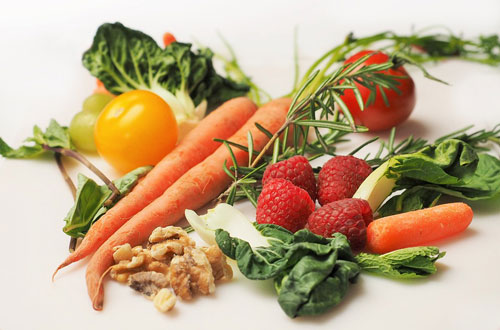It is well known that exercising and discontinuing bad habits such as smoking and drinking alcohol will help us live a healthier life. Eating healthy foods is a big part of that healthy lifestyle. Not only will it improve your overall health, but there are some vitamins and minerals that can have a direct effect on healthier vision.
 Beta-carotene is an antioxidant carotenoid that converts to vitamin A in the body. It is the red/orange pigment found in fruits and vegetables. Vitamin A helps the surface of the eye, mucous membranes and skin to be effective barriers against bacteria and viruses, reducing the risk of eye infections and other infectious diseases. It also has been found that the intake of beta-carotene can help with night vision. Vitamin A is needed to help the eye convert light into a signal the brain uses to perceive images in dim light and darkness. Vitamin A eye drops are currently used in the treatment for Dry Eye Syndrome and superficial punctate Keratitis. Foods that contain beta-carotene are carrots, sweet potatoes, apricots, and cantaloupe.
Beta-carotene is an antioxidant carotenoid that converts to vitamin A in the body. It is the red/orange pigment found in fruits and vegetables. Vitamin A helps the surface of the eye, mucous membranes and skin to be effective barriers against bacteria and viruses, reducing the risk of eye infections and other infectious diseases. It also has been found that the intake of beta-carotene can help with night vision. Vitamin A is needed to help the eye convert light into a signal the brain uses to perceive images in dim light and darkness. Vitamin A eye drops are currently used in the treatment for Dry Eye Syndrome and superficial punctate Keratitis. Foods that contain beta-carotene are carrots, sweet potatoes, apricots, and cantaloupe.Zinc is a mineral that brings vitamin A from the liver to the retina where it is used to create a pigment called melanin and is an essential mineral found in high concentrations in the eyes. Melanin protects the retina. Low ocular pigmentation (melanin) and long-term exposure to bright light are believed to increase the risk of developing age-related macular degeneration. There is some evidence that zinc supplements may slow the progression of age-related macular degeneration (AMD). But instead of supplements, there are foods that contain zinc that can be eaten on a regular basis. Foods that contain zinc are legumes, black-eyed peas, kidney beans, lima beans, and peanuts. Other foods high in zinc are oysters, lean beef, pork, and chicken - dark and breast meat.
Vitamin C helps support the health of blood vessels in the eye. Eyes need high-levels of vitamin C to function properly, and it’s an anti-oxidant which may help delay macular degeneration. Vitamin C also may slow the progression of cataracts. Foods that contain vitamin C are citrus fruits such as lemons, oranges, grapefruit, and tangerines. Other foods with high-levels of Vitamin C are peaches, red peppers, tomatoes, strawberries, bok choy, cauliflower, and papaya. Heat will break down vitamin C, so try to eat these foods raw.
Omega 3’s are known as essential fatty acids. Not only are they needed for an adult’s healthy eyes, but they appear to stimulate vision development in infants. Several studies have found omega-3 fatty acids may help protect adult eyes from macular degeneration and dry eye syndrome. Essential fatty acids also may help promote proper drainage of intraocular fluid from the eye, decreasing the risk of glaucoma. Foods that contain omega 3’s are salmon, tuna, trout, sardines, and halibut.
Lutein and zeaxanthin lower the risks of macular degeneration and cataracts. And lutein, zeaxanthin and meso-zeaxanthin in the macula block blue light from reaching the underlying structures in the retina, thereby reducing the risk of light-induced oxidative damage that could lead to macular degeneration. Foods that contain lutein and zeaxanthin are kale, spinach, romaine lettuce, collards, turnip greens, eggs, broccoli, peas, and corn.
Vitamin E can protect cells in the eyes from damage. This damage is caused by free radicals unstable atoms that may cause disease or signs of aging, and can break down healthy eye tissue. Free radicals greatly increase the risk of macular degeneration. Foods that include Vitamin E are sunflower seeds, hazelnuts, almonds, sweet potatoes, and fortified cereals.
Understanding how certain foods can lead to better vision and healthier eyes can be life changing. Not only will this lifestyle change help with eye health, but with overall health. You’ll see your way to a longer, more enjoyable life.













